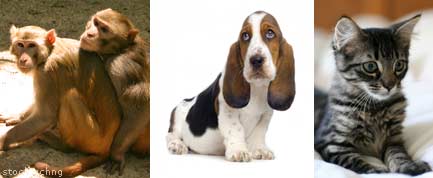Animals Stressed Out, Too

Get the world’s most fascinating discoveries delivered straight to your inbox.
You are now subscribed
Your newsletter sign-up was successful
Want to add more newsletters?

Delivered Daily
Daily Newsletter
Sign up for the latest discoveries, groundbreaking research and fascinating breakthroughs that impact you and the wider world direct to your inbox.

Once a week
Life's Little Mysteries
Feed your curiosity with an exclusive mystery every week, solved with science and delivered direct to your inbox before it's seen anywhere else.

Once a week
How It Works
Sign up to our free science & technology newsletter for your weekly fix of fascinating articles, quick quizzes, amazing images, and more

Delivered daily
Space.com Newsletter
Breaking space news, the latest updates on rocket launches, skywatching events and more!

Once a month
Watch This Space
Sign up to our monthly entertainment newsletter to keep up with all our coverage of the latest sci-fi and space movies, tv shows, games and books.

Once a week
Night Sky This Week
Discover this week's must-see night sky events, moon phases, and stunning astrophotos. Sign up for our skywatching newsletter and explore the universe with us!
Join the club
Get full access to premium articles, exclusive features and a growing list of member rewards.
The economy, the election, and myriad other problems are really stressing out … pets.
When humans get stressed, often their pets take on that stress, too.
"Dogs and cats are very good at picking up stress in people, as are birds," said James Morrisey, a veterinarian at the College of Veterinary Medicine of Cornell University in New York. "I've worked with a parrot who lived with a woman who had a seizure disorder, and the parrot could tell when she was about to have a seizure and warn her."
In addition to carrying the burdens of people, animals — especially wild creatures — have plenty of their own to stress about. Animals will even seek out "comfort food" when they're all wigged out. And stress in animals, as with humans, can be a good or a bad thing.
"In general, the more intelligent an animal is, the more psychological stress it can undergo," Morrisey said. "The less you're thinking about things, the less psychological stress you can potentially be under."
Stress factors
Animals experience stress for a variety of reasons.
Get the world’s most fascinating discoveries delivered straight to your inbox.
A 2004 study of stress-related illness in cats found that the biggest source of stress for domestic cats is unfriendly relationships with other cats in the house.
"Although many owners of cats taking part in the study reported that a fear of strangers was the most common problem they observed, this tends to be a short-term stressor," said researcher Danielle Gunn-Moore of the University of Edinburgh Royal (Dick) School of Veterinary Studies. "If a cat is living with another cat where there is a conflict, this is a chronic situation causing long-term stress."
And a 2006 study found that dogs in shelters get majorly stressed out by the excessive barking of the other dogs there.
"While employees may wear hearing protectors, dogs don't have that option," said Crista Coppola, an adjunct instructor in the department of veterinary medicine at the University of Illinois at Urbana-Champaign. "Excessive noise in shelters can physically stress dogs and lead to behavioral, physiological and anatomical responses."
Prey animals in the wild understandably fret about being eaten, and foragers worry about finding enough food.
That nervous look on a squirrel's face? Yes, you might be anthropomorphizing. But the squirrel indeed has a lot to worry about, and the stress of it all may not be good for him.
Wild animals in captivity are often anxious about being cooped up. And the stressors of social animals can sound strikingly similar to the popularity concerns of high school girls.
Mark Wilson, a neuroscientist at Yerkes National Primate Research Center of Georgia's Emory University, studies captive female rhesus macaque monkeys, housed in groups as they would live in the wild. The monkeys naturally form a hierarchy with some females dominating others, and subordinates enduring harassment and a general lack of control.
"Subordinate females tend to show more anxiety behaviors — things like excessive body scratching, body shakes, excessive yawning, self-grooming, pacing," Wilson said.
Basically, the life of a subordinate female seems to be more stressful.
Overall, though, humans may win the "most neurotic animal" award.
"I think humans probably do get more stressed out because of all the things we deal with in our lives," Wilson said in a telephone interview. "Not to be specieistic here, but animals tend to live fairly stable lives. That having been said, though, danger and stress are a part of animals' everyday lives."
The ice cream cure
Whereas a human might respond to stress by curling up on the couch and eating a pint of ice cream, how do animals handle the strain?
Pretty much the same way, it turns out.
Typically, the subordinate rhesus monkeys had a lower appetite than the dominant macaques, and ate less of their usual low-fat, high-fiber diet.
"But when we gave them a diet more like the American diet, high in fat and sugar, what happens is the subordinates eat more," Wilson told LiveScience. "It's a comfort food. The dominant monkeys don't eat it in excess like the subordinates."
Even rats, stressed out by being stuck in confining tubes for 10 minutes, prefer lard and sucrose water more than non-stressed rats.
Health effects
What's more, the effects of stress on an animal's body are stunningly similar to stress's effects on humans.
In both humans and animals, stress causes the body to release adrenaline and cortisol hormones. These chemicals cause heart rate and respiration to speed up, and suppress the immune system. Stress also clamps down on the reproductive system, reducing libido and reproductive hormones, which ultimately increases the risk for cardiovascular disease.
All these all-too-human effects have also been measured in animals.
Wilson's subordinate rhesus monkeys, for example, have disrupted reproductive cycles, are at higher risk for cardiovascular disease than dominant females, and seem to show up with higher rates of infection and illness.
"Stress is adaptive to a certain degree, but after a while it's really maladaptive," Wilson said. "One of the first things to be affected is the reproductive system. Yeah, it makes some evolutionary sense that you don’t want to reproduce if you're in danger. But when your reproductive system shuts down, you have all these secondary effects, like increased cardiovascular disease risk, which are really maladaptive."
In animal populations, as in humans, some individuals have better coping mechanisms to deal with stress, which gives them an adaptive advantage.
Animal research
To better understand how to combat the effects of stress in the body, Wilson and his colleagues recently conducted an experiment with female rats, in which they increased the amount of a neurohormone called corticotropin releasing factor (CRF), thought to be a driving factor of the body's response to stress, in the rats' brains.
Sure enough, those rats experienced anxious and depressive behavior, decreased libido and disrupted ovarian cycles — all changes seen in human females exposed to chronic stressors.
The researchers hope that by learning about this chemical, they can move toward designing ways for all species to fight the damaging effects of stress.
- Nutrition Quiz
- Video: Why We Age
- Top 10 Amazing Facts About Your Heart
 Live Science Plus
Live Science Plus











